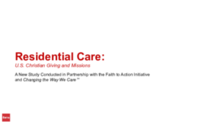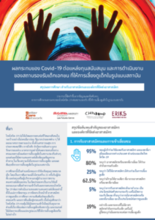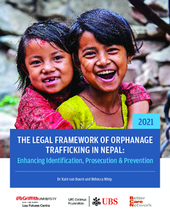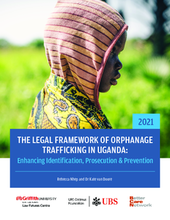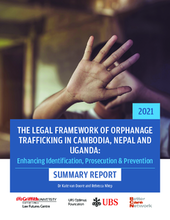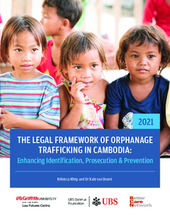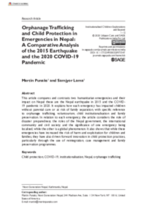<< Back to ReThink Orphanages Home

Resources for Divestment
 Orphanage Divestment Resource
Orphanage Divestment Resource
Orphanage divestment resources for the travel and volunteering sectors
 Divesting of Residential Care Services: Guidelines for Donors
Divesting of Residential Care Services: Guidelines for Donors
These guidelines have been written to guide donors and partners through the process of gathering information, making the decision to divest, securing buy-in internally for divestment, engaging with your partner and other stakeholders, developing your divestment plan, communicating your plan, and addressing any child safety concerns.
Resources for Schools and University Groups
The following resources have been developed by members of the ReThink Orphanages coalition in order to support schools and universities to strengthen their work around overseas student volunteering and travel.
Australia
![]() Curriculum resource - aimed at 15 - 18 year olds, have been designed to support educators in teaching about the complex issue of institutionalisation and orphanage tourism in the classroom.
Curriculum resource - aimed at 15 - 18 year olds, have been designed to support educators in teaching about the complex issue of institutionalisation and orphanage tourism in the classroom.
![]() Self Assessment Tool - Developed by our partner organisations in Australia - Save the Children Australia, World Challenge and ALTO - this self assessment tool has been designed to help schools and universities undertake their own due diligence on their service learning, volunteering and community engagement activities overseas. The tool will help with risk assessment and management of overseas trips and is user friendly, with clear guidance and best practice examples.
Self Assessment Tool - Developed by our partner organisations in Australia - Save the Children Australia, World Challenge and ALTO - this self assessment tool has been designed to help schools and universities undertake their own due diligence on their service learning, volunteering and community engagement activities overseas. The tool will help with risk assessment and management of overseas trips and is user friendly, with clear guidance and best practice examples.
USA
Teaching resources - designed by and for US educators to navigate the complexities of ethical global volunteer practices, including engagement with orphanages and residential care institutions. These resources provide a way to introduce students to: ethical and responsible community engagement and issues of orphanage tourism and voluntourism. The resources are aimed for high school students and can be modified for middle school:
![]() Designing an ethical global service learning program
Designing an ethical global service learning program
Unpacking global poverty through service learning
UK
![]() England curriculum resource - these resources have been developed to support English schools to navigate the complexities of engagement with orphanages and residential care institutions overseas as part of a Gap Year project or an overseas expedition. They are designed to provide an overview of the issues of orphans and vulnerable children, orphanage tourism and ‘voluntourism’, and ethical and responsible community engagement. The resources are aimed at KS4 and KS5 and have been designed to align with the English curriculum - specifically the SMSC and PSHE criteria.
England curriculum resource - these resources have been developed to support English schools to navigate the complexities of engagement with orphanages and residential care institutions overseas as part of a Gap Year project or an overseas expedition. They are designed to provide an overview of the issues of orphans and vulnerable children, orphanage tourism and ‘voluntourism’, and ethical and responsible community engagement. The resources are aimed at KS4 and KS5 and have been designed to align with the English curriculum - specifically the SMSC and PSHE criteria.
The University Pledge
Several universities in Europe have pledged not to support orphanage volunteering by committing to not allow the promotion of such opportunities to their students.
If your school, college or university currently supports an orphanage overseas we can help to review this to ensure that efforts are directed towards programs that will help families stay together.
Resources for Gap Year and Study Abroad Students
Learning Through Volunteering
![]() Our friends over at Learning Service have written a brilliant book called Learning Service: The Essential Guide to Volunteering Abroad, which we would highly recommend you read should you be considering participating in a voluntary experience whilst studying abroad. They also give some fantastic advice on how to increase your learning whilst travelling.
Our friends over at Learning Service have written a brilliant book called Learning Service: The Essential Guide to Volunteering Abroad, which we would highly recommend you read should you be considering participating in a voluntary experience whilst studying abroad. They also give some fantastic advice on how to increase your learning whilst travelling.
Resources for Churches and Short-Term Mission Teams
![]() If you’re planning a short-term mission trip you’re in luck! Our faith-based partner organisations have developed some excellent guidance documents and resources to support you in understanding how to avoid any potential harm and instead ensure positive outcomes for vulnerable children, their families and their communities.
If you’re planning a short-term mission trip you’re in luck! Our faith-based partner organisations have developed some excellent guidance documents and resources to support you in understanding how to avoid any potential harm and instead ensure positive outcomes for vulnerable children, their families and their communities.
Australia
USA
- Christian Alliance for Orphans (CAFO)
- Catholic Relief Services (CRS)
- Faith to Action
- SOE (Standards of Excellence in Short-term Mission)
UK
How Can I Help Bring an End to Short-Term Mission Trips to Orphanages?
Short-term mission trips to orphanages are an established component within the global church’s understanding of their responsibility to vulnerable children. It is definitely not easy to change this practice, but it is possible! Below we’ve put some practical suggestions for ways that short-term missions can be redirected towards programs helping to keep families together.
1. Raise Awareness
Reading this webpage, you may be thinking how have you never heard of this issue before. Although gaining traction within the global church community, this is still far from being common knowledge and so everybody has a responsibility to talk to others and encourage them to think about their role and the role of their church in doing what’s in the best interests of children worldwide. Share what you’ve read here today about the harms associated with short-term mission trips to orphanages with your church leadership and congregation members.
2. Change Policy
Advocate for policy to be created and implemented at your church which prevents short-term mission teams or individuals from volunteering in or visiting orphanages.
3. Examine Your Partnerships
Do you have current partners who encourage short-term mission trips to orphanages that you could arrange to speak to about this issue? Could you choose partners in future based on their commitment to not run these types of trips?
4. Short-Term Mission Preparation
Include a session on the harms of orphanage volunteering and visits in your pre-trip training in order to raise awareness amongst team members before you depart.
Campaigns
 The Love You Give Campaign
The Love You Give Campaign
This campaign has been developed by the Better Care Network, with support from its partner organisations working through the ReThink Orphanages coalition. The cross-sectoral coalition is working to end the popular practice of orphanage volunteering and channel efforts towards programmes designed to prevent family separation.
Volunteering Standards
- The Global Volunteering Standard
- The Code
- Child Safe Movement: Be A Child Safe Volunteer
- Child Welfare and the Travel Industry: Global Good Practice Guidelines
<< Back to ReThink Orphanages Home
See More Resources on Orphanage Tourism, Voluntourism and Trafficking:
Displaying 31 - 40 of 147
This report contains the findings from a nationally representative study conducted by Barna Group of U.S. Christians to better understand U.S. Christian beliefs around and support for orphanages, children’s homes and other forms of residential care for children. It includes data on the amount of funding given to residential care, as well as visits and short-term missions to orphanages.
These presentations from UNICEF and Eurochild were delivered during the June 25 2021 workshop of the Care Measurement Task Force. The focus of the workshop was the development of the residential care toolkit (led by UNICEF) and care measurement in the EU region.
The goal of the present study was to provide data on pre-trip preparation, in-country activities, and how these impacted volunteer perceptions of preparation and trip satisfaction for volunteers working with vulnerable children, including those in residential care (ex. orphanages).
This paper examines the lived experiences of children who interacted with tourists in a performance-based orphanage in Siem Reap, Cambodia.
เอกสารสรุปนี้ดึงข้อมูลและผลการวิจัยจากรายงาน: ผลกระทบของ COVID-19 ต่อสถาบันการดูแลที่อยู่อาศัยที่ดำเนินการโดยเอกชน: ข้อมูลเชิงลึกและนัยสำหรับการสนับสนุนและการให้ความรู้
This study examines Nepal’s compliance with international legal obligations, its child protection and anti-trafficking laws, and its criminal and procedural laws that regulate illegal transfer and trafficking of children. The study also raises issues regarding victim identification, inspection of child care homes and complaint mechanisms.
This report seeks to examine Uganda’s legal and policy framework to identify the relevant offences and mechanisms that could contribute towards the development of a prosecutorial strategy for orphanage trafficking in Uganda.
This study assesses and maps the legal, policy and procedural frameworks in both domestic and international law across Nepal, Uganda and Cambodia, where orphanage trafficking continues to undermine domestic efforts to stem the overuse of institutionalisation of children.
Orphanage trafficking occurs at the nexus of criminal law (human trafficking offences) and child protection regulation. This report examines the intersection of these two legal systems for the purpose of developing a strategy to identify and prosecute orphanage trafficking.
This article compares and contrasts two humanitarian emergencies and their impact on Nepal: these are the Nepal earthquake in 2015 and the COVID-19 pandemic in 2020.

